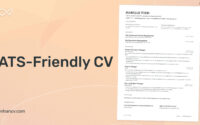Tips For Creating An Effective CV
January 11, 2023
A curriculum vitae, or CV, is a document that summarizes your education, skills, and work experience. It’s typically used for academic or research positions or jobs application.
When writing a CV, it’s important to keep in mind that the goal is to highlight your qualifications and make it easy for a hiring manager or recruiter to see why you’re a good fit for the job. Here are some tips for creating an effective CV:
- Tailor your CV to the specific job or field you’re applying for. Make sure to highlight the skills and experience that are most relevant to the position.
- Use clear and simple language, and avoid using overly complex words or phrases.
- Start with a summary or objective statement that briefly explains your background and qualifications.
- List your education and qualifications in reverse chronological order, starting with your most recent degree or certification.
- Include a section on your work experience, listing your previous jobs in reverse chronological order. Be sure to include your job title, the name of the company, and the dates you worked there.
- If you have any relevant skills or certifications, include a section on those as well.
- Keep your CV organized and easy to read by using clear headings, bullet points, and white space.
- Check your CV for spelling and grammar errors before submitting it.
- Keep your CV updated with your latest skill, achievement, and experience
- Think to make a CV as professional as possible, by using an industry-specific format, and design templates that make it look good.
- Be specific and quantifiable when describing your work experience. Instead of saying “Responsible for managing a team,” say “Managed a team of 10 employees.”
- Include any publications or research you’ve been involved in, as well as any presentations you’ve given at conferences or other events.
- If you’re applying for an academic or research position, including information about your research interests, any grants or funding you’ve received, and any honors or awards you’ve received.
- Highlight any volunteer work or extracurricular activities that are relevant to the job or field you’re applying for.
- Consider including a personal interests or hobbies section, it shows your personality and makes you a well-rounded individual
- If you have any relevant languages you speak, be sure to list them and indicate your proficiency level.
- If you’re applying for a job that requires a specific set of skills, such as programming languages or design software, be sure to list your proficiency level with those skills.
- Make sure to have good contact information, including your current address, phone number, email address, and online portfolio or LinkedIn profile, if you have one.
- Be Honest, Do not exaggerate or falsify any information, It could lead to serious consequences
- Finally, proofread and review your CV multiple times before submitting it to ensure that it is free of errors and presents you in the best possible light. And also consider having another person or professional review it.
- It’s important to keep in mind that the CV is your first point of contact with a potential employer, so it’s important to make a good impression. Taking the time to make sure your CV is well-written and highlights your most relevant qualifications can increase your chances of getting called in for an interview.
Remember that a CV is not a one-size-fits-all document, and you may need to make changes or adjustments depending on the job or field you’re applying for. And always try to keep it concise, usually 2-3 pages long.


